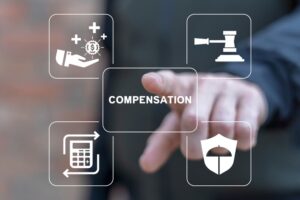Yes, if you have been injured in a collision with a freight train in Missouri, you absolutely have the right to bring a claim against the railroad company if its negligence played a role in the accident.
Southeast Missouri is crisscrossed by major freight lines like Union Pacific and BNSF Railway, a constant and powerful presence in our communities. While we coexist with them daily, the sheer force and size of a freight train make any collision catastrophic. The physical injuries are often severe, but the emotional and financial trauma can be just as devastating. An experienced train accident attorney near you can help protect your rights and fight for the full compensation.
By bringing a personal injury claim against the negligent freight train company, you can hold them accountable for the harm they have caused.
The Devastating Reality of SEMO Train Accidents
A typical freight train can weigh over 6,000 tons and take more than a mile to come to a complete stop. Compared to a 2-ton passenger vehicle, the physics are unforgiving. This immense disparity in size and momentum is why train-car collisions so often result in life-altering injuries or fatalities.
While every accident is unique, many crashes at railroad crossings in Southeast Missouri stem from some form of negligence. It’s rarely as simple as a driver making a mistake; often, there are underlying factors that create a dangerous environment.
Common causes of train accidents in our region include:
- Malfunctioning or Inadequate Warning Systems: We trust the flashing lights, ringing bells, and descending gates at a crossing to keep us safe. When this equipment fails to activate, is broken, or isn’t properly maintained, drivers have no warning of an approaching train. In some rural areas, crossings may lack gates entirely, placing an even greater burden on the railroad to ensure the crossing is safe.
- Obstructed Views at Crossings: A driver can’t avoid a hazard they can’t see. Railroad companies have a duty to ensure that the line of sight at a crossing is clear. Unfortunately, overgrown trees and vegetation, poorly placed signage, or buildings and equipment left too close to the tracks can create a deadly blind spot, making it impossible for a driver to see an oncoming train until it’s too late.
- Poorly Maintained Tracks or Crossings: The railroad company is responsible for the physical condition of its tracks and the crossing surface. Potholes, broken asphalt, or poorly maintained rails can cause a vehicle to get stuck or stalled on the tracks, leaving the driver and passengers in a terrifyingly vulnerable position. Likewise, worn or damaged tracks can contribute to a train derailment, a disaster that can impact anyone nearby.
- Train Operator Error: Train engineers and conductors are human, and they can make mistakes. Speeding, failing to sound the horn as required by federal law, distraction, or operating the train while fatigued are all forms of negligence that can lead to a tragic and preventable accident.
- Lack of Conspicuity: At night or in poor weather, it can be surprisingly difficult to see a train, especially at unlit crossings. If a train’s lights are not working or it lacks adequate reflective markings, it can blend into the darkness, creating a recipe for disaster.
The injuries sustained in these accidents are often catastrophic, including traumatic brain injuries (TBIs), spinal cord damage and paralysis, amputations, severe burns, and internal organ damage. Beyond the physical pain, survivors and their families are left to cope with immense emotional distress and a mountain of unexpected financial burdens.
Understanding Your Legal Rights in Missouri
After being hurt in a train accident, it’s important to understand that the law is on your side. In Missouri, individuals who are harmed by the carelessness or negligence of another party have the right to seek financial compensation for their losses. This legal principle is the foundation of a personal injury claim.
When it comes to railroad companies, they are held to a very high standard of care. They are not just any company; they are “common carriers,” which means they have a heightened legal duty to operate safely and protect the public.
Key legal elements in a SEMO train accident case include:
- Duty of Care: The railroad company has a legal obligation to maintain its tracks, crossings, and equipment in a safe condition. This includes ensuring warning signals are functional, sightlines are clear, and their employees are properly trained and following safety protocols.
- Breach of Duty (Negligence): To have a successful claim, you must show that the railroad company failed to meet its duty of care. For example, proving that they knew about a malfunctioning signal at a Poplar Bluff crossing but failed to fix it would be a clear breach of their duty.
- Causation: You must connect the railroad’s negligence directly to the accident and your injuries. Your attorney will work to build a clear and undeniable link showing that because of the company’s failure, the collision occurred.
- Damages: These are the losses you have suffered as a result of the accident. This includes not only medical bills and vehicle repairs but also lost income, physical pain, and emotional trauma.
Both federal and state regulations govern railroad operations. The Federal Railroad Administration
(FRA) sets comprehensive rules for everything from track inspections to how long a train crew can work. An experienced SEMO train accident lawyer will understand how to use violations of these complex regulations to build a powerful case on your behalf.
Can You Sue a Freight Train Company in Missouri?
Yes, you can sue a freight train company, but it’s important to understand the legal landscape. Success hinges on proving that the company’s negligence was a contributing cause of the accident. Key considerations for your case include:
- Proving Negligence: This is the core of your case. An attorney will launch a thorough investigation, potentially bringing in accident reconstruction experts, engineers, and signal experts to analyze the evidence and establish that the railroad was at fault.
- Missouri’s Comparative Fault Rule: Missouri law recognizes that sometimes more than one party may be partially at fault for an accident. Under the rule of “pure comparative fault,” you can still recover compensation even if you are found to be partially responsible. However, your total compensation award will be reduced by your percentage of fault. For example, if a jury finds you were 10% at fault, you would receive 90% of your damages. Railroad companies will aggressively try to shift as much blame as possible onto the victim, which is why having a skilled lawyer to fight back against these tactics is essential.
- Statute of Limitations: In Missouri, you generally have five years from the date of the accident to file a personal injury lawsuit. However, if the accident tragically resulted in the death of a loved one, the time limit for a wrongful death claim is shorter: three years. These deadlines are strict. If you miss them, you lose your right to seek justice forever. It is vital to contact an attorney as soon as possible to ensure your rights are protected.
What Compensation Can You Recover in a Train Accident Claim?
No amount of money can undo the trauma you’ve experienced, but fair compensation can provide the financial stability you and your family need to heal and move forward. A successful claim can help you recover damages for:
- Medical Expenses: This covers everything from the initial emergency room visit and hospital stay to surgeries, medication, physical therapy, rehabilitation, and any future medical care you may need for the rest of your life.
- Lost Wages and Earning Capacity: If your injuries have kept you from working, you can be compensated for the income you have lost. If your injuries are permanent and prevent you from returning to your job or working at all, you can also seek compensation for your diminished future earning capacity.
- Pain and Suffering: This compensates you for the physical pain, emotional distress, anxiety, PTSD, and loss of enjoyment of life that you have endured as a result of the accident.
- Property Damage: This covers the cost of repairing or replacing your vehicle and any other personal property that was destroyed in the collision.
- Wrongful Death Damages: If you have lost a family member, you may be able to pursue a wrongful death claim to recover for funeral and burial expenses, the loss of financial support, and the profound loss of your loved one’s companionship, guidance, and support.
- Punitive Damages: In cases where the railroad company’s conduct was found to be exceptionally reckless or malicious, a jury may award punitive damages. These are intended not to compensate the victim, but to punish the company and deter similar behavior in the future.
Why Claims Against Railroads Are So Challenging
Taking on a multi-billion-dollar railroad corporation is not like a typical car accident claim. These companies have near-limitless resources and are prepared to fight vigorously to protect their bottom line.
You can expect them to deploy aggressive defense tactics, such as:
- Blaming the Victim: Their first strategy is almost always to argue that the driver was at fault—that you ignored signals, were distracted, or were driving recklessly.
- Hiding or Destroying Evidence: Key evidence, like a train’s event data recorder (“black box”) or maintenance logs, is in the railroad’s possession. An immediate legal response is often needed to preserve this evidence before it “disappears.”
- Delaying and Denying: They will use their legal teams to drag out the process, hoping you will become frustrated and accept a lowball settlement offer that doesn’t come close to covering your actual losses.
Facing this alone is an impossible task. You need a team on your side that knows their playbook and isn’t intimidated by their tactics.
How a SEMO Train Accident Lawyer Can Help You Fight Back
An experienced personal injury attorney with experience handling railroad accident cases can be your most powerful ally. They level the playing field and manage every aspect of your case so you can focus on what matters most: your recovery.
A dedicated SEMO train accident lawyer will:
- Launch an Immediate Investigation: They will act quickly to preserve crucial evidence, hire top experts to analyze the scene, review the train’s data recorders, and uncover any history of safety violations by the railroad.
- Handle All Communication: Your lawyer will take over all contact with the railroad’s attorneys and insurance adjusters, protecting you from their pressure tactics and ensuring your rights are not compromised.
- Accurately Value Your Claim: They will work with medical and financial experts to calculate the full, long-term cost of your injuries, including future medical needs and lost income, to ensure you demand full and fair compensation.
- Negotiate from a Position of Strength: Armed with powerful evidence and a clear valuation of your case, your attorney will negotiate aggressively for a fair settlement.
- Take Your Case to Trial: If the railroad company refuses to offer a just settlement, a skilled trial lawyer will be fully prepared to present your case to a judge and jury, fighting tirelessly to secure a favorable verdict.
SEMO Train Accident FAQs
Below are answers to frequently asked questions about freight train accidents:
Can I sue the railroad if my car was hit at a crossing in Southeast Missouri?
Yes. If you can show that the railroad company’s negligence—such as a malfunctioning signal, an obstructed view, or an unsafe crossing—contributed to the accident, you have the right to file a lawsuit to recover damages for your injuries.
What if the crossing gates and lights were working? Can I still have a case?
Potentially, yes. Even if the basic signals were active, a case for negligence may still exist. For example, was the warning time provided by the signals adequate for the train’s speed? Was the crossing located in a way that made it “extra-hazardous,” requiring more than just standard warnings? Was the train operator speeding, or did they fail to sound the horn? An investigation can uncover these and other factors.
The railroad’s insurance adjuster seems friendly and has already offered me a settlement. Should I take it?
It is extremely important that you do not accept any offer or sign any documents from the railroad’s insurance company without first speaking to an experienced attorney. While the adjuster may seem concerned and helpful, their job is to protect the railroad’s financial interests by settling your claim for the lowest possible amount.
Cook, Barkett, Ponder & Wolz: Your Advocates for Justice in Southeast Missouri
Train accidents can be traumatizing. You’re in pain, you’re worried about the future, and the last thing you need is a legal battle against a powerful corporation. At Cook, Barkett, Ponder & Wolz, we are here to lift that burden from your shoulders.
Our team of experienced personal injury trial lawyers in SEMO is dedicated to fighting for justice with a combination of deep experience and genuine client care. With deep roots in the local market, from Cape Girardeau to Poplar Bluff and Sikeston, we understand the unique legal landscape of SEMO and the challenges you face. Our success comes from not just knowing the law, but from knowing you.
With more than 100 years of combined trial experience, we have the knowledge and skill to take on the toughest cases. If you or a loved one has been injured in a train accident in Southeast Missouri, please do not wait. Let us stand by your side, fight for your rights, and help you move forward.
Call our dedicated team today at (573) 335-6651 or through our online form for your free, no-obligation case evaluation.





